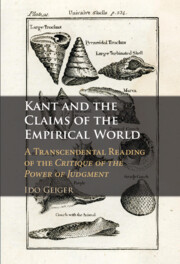 Kant and the Claims of the Empirical World
Kant and the Claims of the Empirical World Book contents
- Kant and the Claims of the Empirical World
- Kant and the Claims of the Empirical World
- Copyright page
- Dedication
- Epigraph
- Contents
- Acknowledgments
- Abbreviations
- Introduction
- Chapter 1 The Charge of Reflective Judgment and the Conceptual and Aesthetic Purposiveness of Nature
- Chapter 2 Organisms, Teleological Judgment and the Methodology of Biology
- Chapter 3 The Antinomy of Teleological Judgment
- Chapter 4 Discursivity and the Conceptual Purposiveness of Nature
- Chapter 5 The Significance of Form and the Aesthetic Purposiveness of Nature
- Conclusion: Kant’s Empiricism
- References
- Index
Chapter 3 - The Antinomy of Teleological Judgment
Published online by Cambridge University Press: 30 April 2022
- Kant and the Claims of the Empirical World
- Kant and the Claims of the Empirical World
- Copyright page
- Dedication
- Epigraph
- Contents
- Acknowledgments
- Abbreviations
- Introduction
- Chapter 1 The Charge of Reflective Judgment and the Conceptual and Aesthetic Purposiveness of Nature
- Chapter 2 Organisms, Teleological Judgment and the Methodology of Biology
- Chapter 3 The Antinomy of Teleological Judgment
- Chapter 4 Discursivity and the Conceptual Purposiveness of Nature
- Chapter 5 The Significance of Form and the Aesthetic Purposiveness of Nature
- Conclusion: Kant’s Empiricism
- References
- Index
Summary
Chapter 3 tackles the considerable exegetical difficulties posed by the antinomy of teleological judgment. Although the Dialectic of Teleological Judgment poses an antinomy between regulative maxims of reflective judgment, it also presents a conflict between would-be constitutive principles of determinative judgment. This fact has led a number of readers to conclude that the latter conflict is the antinomy of teleological judgment and the former is its resolution – Kant’s explicit claims to the contrary notwithstanding. The chapter argues that posing the conflict between would-be constitutive principles of determinative judgment is explained by the attempt to assimilate characteristic features of a dialectic, specifically the fact that it ensnares ordinary understanding. Building on the earlier discussion of the distinction between explanation and description, it further claims that the regulative maxims of reflective judgment do not contradict one another, even as they are first presented, but in fact essentially complement one another. The maxim of teleology governs the description or observation of organisms as self-organizing beings; the maxim of mechanism directs us to seek to explain their generation and the processes they undergo mechanistically, just as all other causal processes are to be explained.
Keywords
- Type
- Chapter
- Information
- Kant and the Claims of the Empirical WorldA Transcendental Reading of the <I>Critique of the Power of Judgment</I>, pp. 83 - 97Publisher: Cambridge University PressPrint publication year: 2022


